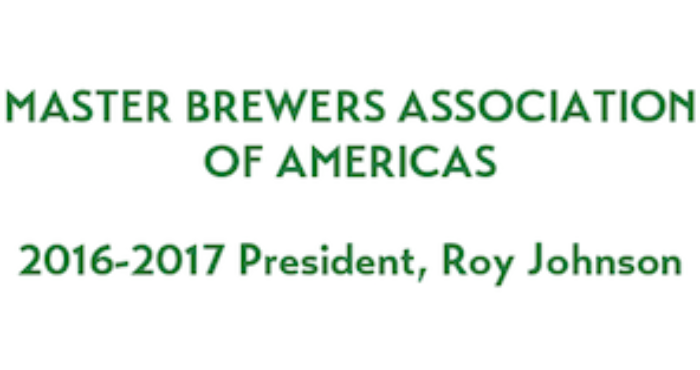A few words from the parting President of the MBAA
John I. Haas’s own Roy Johnson recently completed his term as President of the Master Brewers Association of the Americas (MBAA). We sat down with Roy as he reflected on the time he spent serving an organization he’s been a part of for more than 20 years.

John I. Haas’s own Roy Johnson recently completed his term as President of the Master Brewers Association of the Americas (MBAA). We sat down with Roy as he reflected on the time he spent serving an organization he’s been a part of for more than 20 years.
Q: Roy, you just finished up your term as the President of the MBAA. Could you tell us a little bit about the organization—and how you got involved?
Roy Johnson: The MBAA is the industry leader and resource for the dissemination of technical knowledge when it comes to brewing. So we try to get into the brewers’ world to give them access to tools and information that will help with their production needs and increase their production quality.
I’ve been a member since about 1994, when I worked in QA for MillerCoors. Back then, the big brewers made up most of the membership. They asked me to be a District Treasurer-Secretary, then the District President for Cincinnati (now District Midwest), which I held for about 10 years. Over time, I got involved with the national organization in a number of different roles.
It is a really great way to get a perspective of what’s going on at the grass-roots level, and then to understand what the MBAA is trying to do from a national perspective. A few years ago, when I started working with John I. Haas and the Barth-Haas Group, the Master Brewers’ Executive Board asked me to think about being President. I was honored—and I felt like I really understood the organization, so I was happy to say yes.
Q: The brewing world has changed a lot since 1994. Has the MBAA changed with it?
Roy: Membership-wise we’re at an all-time high of 4,600 members, which I’m proud of. But, with more than 6,000 breweries out there, we should probably be even higher. So, yes, the face of the MBAA has changed over the last 20 years.
Back then, all the big brewers had their own technical resources within the brewery, so MBAA meetings were more about networking and golf. Today, craft brewers don’t have access to those kinds of technical resources and they take these MBAA meetings really seriously. When you go to a district meeting, you have their full attention; they’re always soaking up knowledge and trying to figure out how to solve problems and do it better.
There’s a lot of pressure on these younger brewers to learn and to know as much as they can. Craft brewers work with each other; they help each other. It’s a true network, a family that has a passion for everyone to succeed. That’s where the MBAA comes in to work with brewers, to bring in speakers, to provide technical insights—both at the meetings but also on the website—and to give them access to experts who might help with an issue or challenge they’re having at the brewery.
Q: What are some of the questions or concerns you most often hear at the district level?
Roy: People are always worried about the new breweries coming on board, and whether or not they’re going to make good beer. As a craft brewer, it’s in your best interest for your competitor to make a good glass of beer. If customers go in and have a bad experience, they might never come back—not just to that brewery, but to craft in general. So, from a technical standpoint, brewers want other brewers to make good beer because we really are all in this together.
Another topic that comes up often is hops—what types of varieties are available, accessibility, and pricing, of course. Hops have been so in-demand in recent years, it’s affected price. And while the balance is shifting, it’s still a hot topic. When I’m at a district meeting, I’m typically the guest speaker, so I try to provide them with a market perspective on what’s happening in our world as a hops supplier and flavor R&D partner. Ultimately, brewers are most concerned about issues close to home, such as, getting the hop varieties and the advanced hop products they need to keep innovating and meeting their customers’ demands.
Q: The 2018 National Convention was just scheduled for Ontario—you were pretty excited about that.
Roy: Absolutely. Right now, there are over 300 craft breweries in Ontario, and 600–700 craft breweries in Canada. Craft is booming up there, which is really exciting. Canada also represents a great market opportunity for brewers, especially as the U.S. market matures.
I always go up to the District Canada meeting in Ontario, and I realized they’re always coming down to the national meetings. The last time we held a national meeting there was in 1995. So it seemed like it was time we got back up to Ontario—and a great time to shine a light on their participation, and all the energy that’s happening in Canadian craft. I’m really excited we were able to make it happen!
Q: Are you pretty happy with your tenure as President? Is there anything you wish you’d done differently?
Roy: I wanted to spend more time thinking about the long-range strategic positioning of the Master Brewers. It’s hard because you’re President only for a year and there’s a lot of weekly and monthly business to take care of. I spent a lot of time doing outreach to the local presidents, trying to figure out how we, as a national organization, can be more transparent, more responsive, and more helpful to them. Over the course of the year, I visited about 15 or 18 of the 25 Districts, which I think helped in that regard, and brought us closer.
Q: What is your vision for the MBAA?
Roy: I’d like to see the MBAA become super accessible to the local brewer. We are already putting mechanisms in place to achieve that—there’s a program called Ask the Brewmaster and we’re starting to do some podcasts. We’re really starting to reach out, from a technical standpoint, to the local brewers.
My wild vision for the MBAA would be to have a person “on call” to provide support, whenever a brewer needs it. Every Thanksgiving, 100,000 people call Butterball to ask questions about their “turkey emergencies”…I’m not sure how it would work, but I’d love it if the MBAA could be that same kind of technical resource for brewers. But it’s not easy (laughs), most of us are volunteers!
For more information on the Master Brewers Association of Americas (MBAA), click here.




